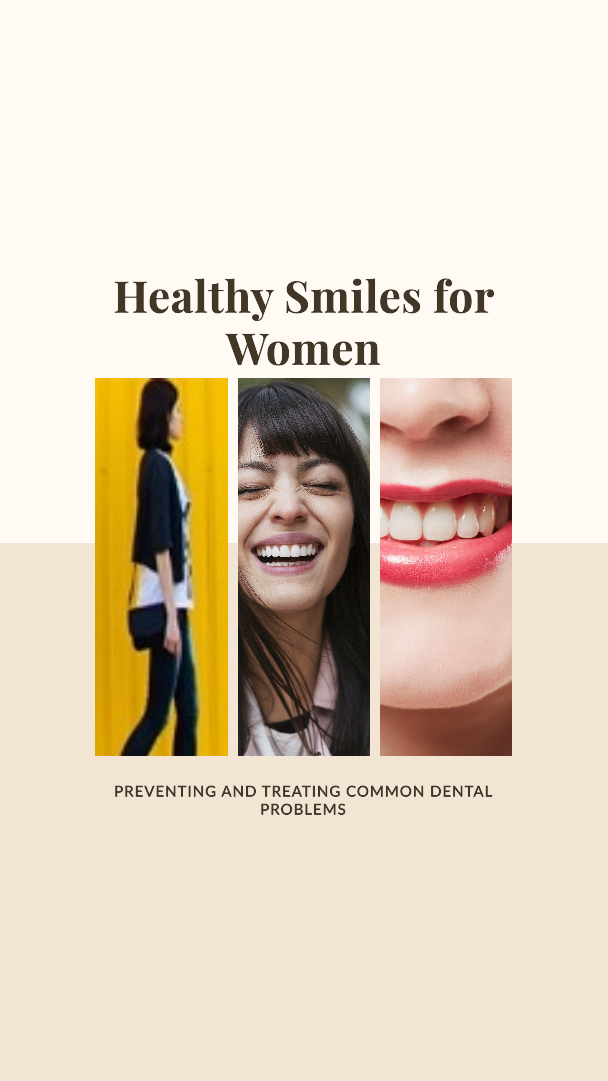Common Dental Problems in Women: A Comprehensive Guide
Women's dental health is influenced by a myriad of factors, including hormonal changes, pregnancy, and menopause. These unique aspects can make women more susceptible to specific dental issues. Understanding these problems and their preventive measures can help maintain optimal oral health throughout various life stages. Here are some of the most common dental problems faced by women
 1. Gum Disease
1. Gum Disease
Gum disease, or periodontal disease, is a significant concern for women. Hormonal fluctuations during puberty, menstruation, pregnancy, and menopause can make gums more sensitive and prone to inflammation and bleeding. Gingivitis, the early stage of gum disease, can progress to periodontitis if left untreated, leading to tooth loss.
Preventive Measures:
Maintain a rigorous oral hygiene routine, including brushing twice a day and flossing daily.
Schedule regular dental check-ups and cleanings.
Use an antimicrobial mouthwash to reduce plaque buildup.
2. Tooth Decay
Tooth decay is prevalent among women, often exacerbated by dietary choices and oral hygiene habits. Pregnancy cravings for sugary foods can increase the risk of cavities. Additionally, morning sickness can expose teeth to stomach acids, which can erode enamel.
Preventive Measures:
Limit sugary and acidic foods and beverages.
Use fluoride toothpaste to strengthen enamel.
Rinse your mouth with water or a fluoride mouthwash after vomiting during pregnancy.
3. Dry Mouth (Xerostomia)
Hormonal changes, certain medications, and menopause can lead to dry mouth in women. Reduced saliva production can increase the risk of tooth decay and gum disease, as saliva helps neutralize acids and wash away food particles.
Preventive Measures:
- Stay hydrated by drinking plenty of water.
- Chew sugar-free gum to stimulate saliva production.
- Avoid caffeine and alcohol, which can contribute to dry mouth.
4. Temporomandibular Joint Disorders (TMJ)
Women are more likely to suffer from temporomandibular joint disorders, which affect the jaw joint and muscles controlling jaw movement. TMJ disorders can cause pain, discomfort, and difficulty in chewing.
Preventive Measures:
- Practice stress-reducing techniques, such as yoga or meditation, to avoid clenching or grinding teeth.
- Avoid chewy foods that can strain the jaw.
- Use a mouthguard at night if you grind your teeth.
5. Pregnancy Gingivitis
Pregnancy gingivitis affects many expectant mothers, typically occurring in the second to eighth months of pregnancy. Increased progesterone levels can enhance the growth of bacteria that cause gingivitis, leading to red, swollen, and bleeding gums.
Preventive Measures:
- Maintain excellent oral hygiene, brushing twice daily with fluoride toothpaste and flossing.
- Visit your dentist for professional cleanings and check-ups during pregnancy.
- Use an antimicrobial mouthwash to help control plaque.
6. Menopausal Gingivostomatitis
Menopausal gingivostomatitis is characterized by dry, shiny gums that bleed easily and have a pale to deep red appearance. It is less common but can be quite uncomfortable for those affected.
Preventive Measures:
- Use estrogen supplements if recommended by your healthcare provider.
- Maintain good oral hygiene practices.
- Consider using a moisturizing mouth rinse to alleviate dryness.
7. Oral Cancer
Oral cancer can affect anyone, but certain factors like smoking and alcohol use increase the risk. Regular dental check-ups can help in early detection, which is crucial for successful treatment.
Preventive Measures:
- Avoid tobacco products and limit alcohol consumption.
- Protect your lips from sun exposure using lip balm with SPF.
- Get regular oral cancer screenings during dental visits.
Conclusion
Women's dental health requires special attention due to the various hormonal changes they experience throughout their lives. By understanding the common dental problems and implementing preventive measures, women can maintain their oral health and overall well-being. Regular dental check-ups, proper oral hygiene, and a healthy lifestyle are key components in preventing and managing these dental issues.



Recent Comments